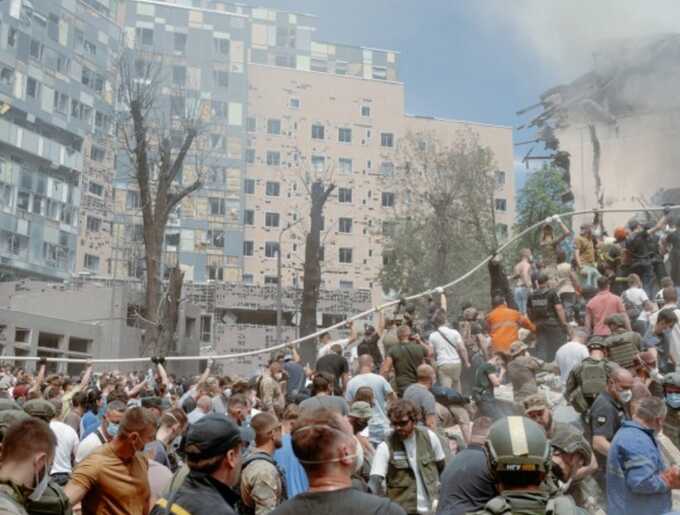EU and UK sanctions impact Russia’s military, energy, and trade sectors

The EU’s largest sanctions package, along with new UK measures, is designed to undermine Russia’s war efforts, strengthen energy restrictions, and fight against sanctions evasion as the war in Ukraine moves into its fourth year.
As Russia’s war in Ukraine enters its fourth year, the European Union has adopted its 16th sanctions package on Monday, expanding economic and financial restrictions on Moscow.
“Nobody in Europe wants the war to continue. Peace can only be won through strength towards the aggressor,” EU High Representative for Foreign Affairs and Security Policy, Kaja Kallas, said.
Seen as the most extensive EU sanctions, the new measures target key sectors, including energy, trade, transport, and finance, aiming to curb Russia’s ability to fund its war while cracking down on sanctions evasion.
The package also strengthens enforcement mechanisms, extends restrictions to Belarus, and underscores the EU’s commitment to a just and lasting peace for Ukraine, the EU believes. The latest package includes 83 additional listings, comprising 48 individuals and 35 entities.
To combat sanction circumvention, the EU has nearly doubled the number of vessels classified as part of Russia’s shadow fleet—from 74 to 153—which play a key role in Kremlin energy revenues. The bloc has also imposed export restrictions on 53 new companies, including foreign firms, that either support Russia’s military-industrial complex or aid in evading sanctions.
The new measures include an import ban on Russian primary aluminum, with a temporary quota for limited imports over the next year. Export restrictions have been expanded to block Russia’s access to dual-use goods, including chemical precursors, CNC software, and repurposed video game controllers used in warfare. Additional bans target military-related industrial materials like minerals, chemicals, and steel. In the energy sector, the EU has prohibited the temporary storage of Russian crude oil in its ports, tightened restrictions on LNG and crude oil projects, and imposed stricter controls on oil and gas exploration software.
The EU has strengthened transport, infrastructure, and financial sanctions. A flight ban now includes third-country airlines operating domestic routes in Russia or supplying aviation goods, preventing them from entering EU airspace. New road transport rules limit Russian ownership in EU transport companies to 25 percent. Major Russian infrastructure, including airports and seaports, is now subject to a full transaction ban, along with a prohibition on EU construction services in Russia. In finance, 13 smaller banks have been added to messaging bans, and restrictions are placed on institutions linked to violations of oil price caps.
The United Kingdom on Monday also unveiled the largest sanctions package against Russia since 2022, with more than 100 measures targeting its military-industrial complex, foreign suppliers, and key facilitators of sanctions evasion. The measures hit producers and suppliers of machine tools, electronics, and dual-use goods—such as microprocessors used in Russian weapons systems—based in China, Turkey, India, Thailand, and Central Asian states.
As part of the package, the U.K. also imposed sanctions on North Korean Defense Minister No Kwang Chol and senior officials linked to the deployment of over 11,000 North Korean forces to Russia, where they have reportedly suffered more than 4,000 casualties.
Additionally, the U.K. blacklisted 13 Russian entities, including LLC Grant-Trade and its owner Marat Mustafaev, along with his sister Dinara Mustafaeva, for allegedly funneling advanced European technology into Russia to support its war effort.
The new sanctions aim to further squeeze Putin’s energy revenues, a crucial funding source for his invasion. They target 40 additional ‘shadow fleet’ ships transporting Russian oil, which have carried over $5 billion in oil and products in the past six months. This brings the UK’s total sanctioned oil tankers to 133, the most of any European nation.
The measures also include sanctions on 14 ‘New Kleptocrats,’ including Roman Trotsenko, the owner of Aeon Corporation—a Russian investment and management company—and one of Russia’s wealthiest men, valued at 2.2 billion British pounds ($2.78 billion).
“Every military supply line disrupted, every rouble blocked, and every enabler of Putin’s aggression exposed is a step towards a just and lasting peace…” Foreign Secretary, David Lammy, said. He emphasized that lasting peace will only be achieved through strength.
“That is why we are focused on putting Ukraine in the strongest possible position.”
The latest EU and U.K. sanctions against Russia coincide with the European Leaders Summit on the Support of Ukraine in Kyiv, where the EU pledged to further strengthen and support Ukraine.
“I can announce that a new 3.5 billion euros ($3.67 billion) payment for Ukraine will arrive already in March,” President of the European Commission, Ursula von der Leyen said addressing the summit.
She also stressed she will present a comprehensive plan on how to scale up European arms production and defence capabilities and from which Ukraine will also benefit.
While imposing a new package of sanctions on Russia, von der Leyen also mentioned that “an ambitious package on energy security” has been prepared for Ukraine.
“The aim is to ensure a resilient, secure and competitive energy system for Ukraine. We will fully integrate Ukraine’s and Moldova’s electricity market with our electricity market by the end next year. And we will seize the full potential of Ukraine’s vast gas storages, of which 80percent are located close to EU Member States,” she added. Von der Leyen said this move will generate income for Ukraine and accelerate investments in Ukraine’s renewable energy, ultimately leading to greater energy security for both—Ukraine and the EU.
Read more similar news:
Comments:
comments powered by Disqus
































